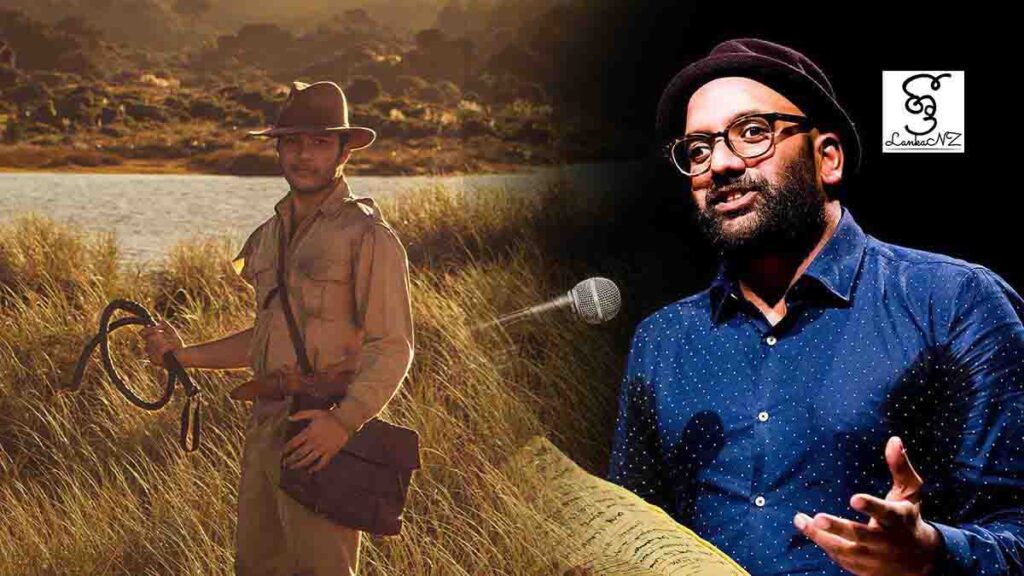As the author, Robert Mckee once said “Storytelling is the most powerful way to put ideas into the world today”. That is exactly what Ahi Karunaharan, a Sri Lankan descent writer, director, actor, and producer is trying to do on the New Zealand stage. Ahi is exploring the Sri Lankan voice through his storytelling in theatre. So, we at Sri LankaNZ caught up with Ahi to talk everything about community, culture, passion, and his new show “The Mourning After”.

Let’s start from the very beginning, how did you get into theatre and art?
I was in Colombo, Sri Lanka for about 7 years. There, I went to St. Thomas College in Kollupitiya. At school, I was not very good at maths and science. I had lots and lots of tuition classes but numbers and things really did not go down well. However, you know, music and performance just came to me so easily. St. Thomas had an art section in the school and we used to do dramas and plays on Sundays for church. That was the place I really enjoyed and where I found myself. My family was really into the arts as well. Ever since I was a kid, I always loved telling stories to my family and being the entertainer. Every time when uncles and aunties come to our place, I was always asked to sing songs and narrate stories and so on. I think that is where my real passion came from.
Then we moved to Wellington, New Zealand. Education here was very different from Sri Lanka. I was encouraged to follow my passion for music and art. But you know, in my family and you know, in our community that is only cheered as a hobby and it definitely cannot be a full-time thing. But, you know, there is a certain freedom that New Zealand brings to you. So, I was able to dive a lot more, go to university, and pursue art and performing. I was looking at great artists that come from Sri Lanka and even from here and I found that stories can heal, stories can transform and stories can take us to places that we could not go. When me and my family left Sri Lanka in 1990, our memories of the home were very hurtful and hard. At that point, we could not and did not want to go back. But through theatre and through film, I could recreate home here. That is what made me go into theatre and art.
How was your experience in learning art and music in New Zealand?
So, I went to Toi Whakaari: New Zealand Drama School in Wellington and trained there. There is an actress there called Rashmi Pilapitiya. She was the first-ever Sri Lankan to go to the national school of drama. When I saw her, it boosted my confidence. Somebody in our community has already done this, so I felt that I can do it too. Subsequently, when I graduated, all my active work was either playing dairy owners, taxi drivers, and even terrorists. I was really frustrated. I also realized that the work we were seeing here in New Zealand was mostly about India. People just assumed that we all were part of the same world. But we are not! The Sri Lankan voice is very different. Our people, politics, and our stories are so different and unique. That is when I realized the power of writing my own stories and directing my own work. Last few years, I have really started to own the Lankan voice and go towards stories that come from our surroundings. I started with my play “Tea” which told the history of colonization and Sri Lankan tea plantation. And then “The Mourning After”, which looks at how Sri Lanka rebuilt itself after such a devastating tsunami. If you look at Lanka as a country, we are a hard-working nation. Because I lived there, I still feel a sense of resilience and hope in the people on the land. So, my stories are always about how can we move forward and how can we overcome our differences to sit in the same room and enjoy a human moment. That is what motivates me as an artist.
You talked about being typecast and also about the South Asian representation on the stage in New Zealand. How was your experience of it back when you started and how has it changed now?
The only representation that I saw was in community shows. We were telling stories in either Tamil Society, in Sri Lankan Society, or in the United Sri Lankan Association. Only within our spaces and not in other theatres. Like I said earlier, Rashmi was the only female brown actor that existed in this space for 20 years. She really was. And nobody was casting her. They only cast her when they had an African character. She was not even playing an Indian or a Sri Lankan. And the only other male actor who existed was Jacob Rajan. He came from a company called “Indian Ink”. So when I came out of drama school, I was looking at these government-funded, publicly funded theatre companies and was wondering where our people were. We all pay tax for these arts organizations. It says that art is for all New Zealanders. We are New Zealanders but why our voices not being heard? They cannot just come for us for Diwali and diversity. It has to be the norm.
I think this has shifted in the last five years. Because I think the ways power works and who makes the decisions are changing with online presence and activism happening all around the world. Hollywood is shifting, television is shifting and things that did not seem possible even five years ago are happening now. I think New Zealand is heading towards a change and a new direction which is a bit cluttered.
Your play “The Mourning After” is coming to Q Theatre in Auckland next week. What is the drama about?
I started writing Mourning After when I was in my final year at drama school. When I was writing the drama I was going down on my memory of what I remembered of Lanka when I left as a 10-year-old. My brother was born in New Zealand and he only knew Sri Lanka through the photos and stories that my mom and I told him. We were planning on visiting Sri Lanka but then the Boxing day Tsunami happened. Our villages, people, and everything were gone. So now when my brother goes back to Lanka, everything we have told him does not exist. I was really interested in that idea; going back to a home that is no longer there or that has shifted and changed. I think this is an experience we all share. When we go and settle overseas, we take a sense of nostalgia or a memory that we hold on to. But sometimes when we go back a lot has changed. Our houses are now apartments, the shops we used to go to are now cafes and so on. Modernization and urbanization come with the loss of something.
You know, we turn up in the news in New Zealand only if it is about cricket, a Dilma Ad, or when something absolutely terrible happens. I remember that when the 2014 Tsunami happened, we were all over New Zealand news. That was the first time in 30 years of my life in New Zealand, we were the headline news. It was so strange to hear Sinhala and Tamil on TV. But Jennifer Aniston and Brad Pitt broke up around the same time and that became the breaking news. Ours disappeared. So I was interested in the idea of telling a story about people that were forgotten. So “Mourning After” is about a young New Zealand-born Sri Lankan who goes back to his country to find that his village is no longer there. Through the people who survived, he tries to recreate the village that he remembers and find a sense of himself. There is a “Kabaragoya” (monitor) that keeps following him and he does not know why. There is an uncle who’s always drunk and sings “Surangani” (A popular song in Sri Lanka). I have included all these things that are so iconic for Sri Lankans and things that I have grown up loving. It is also about taking the younger generation back to a time before the tsunami happened or even before the war happened. It’s a creation of paradise; what our land used to be and could have been like.
You said you wrote it for the first time when you were in drama school. How has this new production of the drama changed?
I first did it as a 20 minutes show. Then a company came to me and they wanted to produce it. Then I did a solo one-hour show. All the characters, there were 9 characters including the “Kabaragoya”, were played by me. When I moved to Auckland, I saw there are more actors here and that I don’t have to do all the characters. So I did the drama again in 2015. But I was young then. I believe now I am better at articulating and braver in writing. So it has gone back to the original solo play. Rising young actor Jehangir Homavazir performs the role with fresh energy and perspective. I found him when I was teaching at New Zealand Drama School and he is an artist who is so hungry to tell stories from communities that don’t get seen or heard. He is on the stage for an hour, plays 7 characters, speaks Tamil, Sinhala, sings, and dances. He is such a talented one.
And also in 2015, I went to Sri Lanka after 25 years. When I wrote “Mourning After” before going back, I wrote it with an image of what home would be like. The difference now is I have been there and seen what it is. Going back was really interesting. I got to see how modern and liberal-minded Lanka has become compared to the time when we were there. I went and saw a lot of art space and theatre and saw what was being made. There was a pain as well. But I am all about moving forward. The title “Mourning After” itself describes that we need to mourn for what happened in the past and acknowledge it but we need to move forward and learn to not tell the same story again.
Who are the other Sri Lankans that are involved in the play?
Our music director is Karnan Saba. Karnan and I grew up together in Wellington and he has done music for all my theatre work. I wanted the music of the play to have songs that we grew up listening to. There is “Surangani”, which is a song that almost everybody knows in Sri Lanka. Then there are some old Hindi and Tamil songs that were popular in the 80s as well. And there is music from the film, “Indiana Jones and the Temple of Doom”. It is not a commonly known fact that the film was shot in Sri Lanka. Because India did not allow them to shoot there, they filmed it in Kandy, Sri Lanka. The Sri Lankan actors were there dressed as Indians but spoke Sinhalese. The 10-year-old me was fascinated by seeing that on TV. That is why that music is there.
Senuka Sudusinghe is our drummer. He is a dance teacher as well. His dad taught me all the mudras and Sri Lankan dance back at drama school. Senuka was a young kid back then and he is now studying at Victoria University, Wellington. We have Deeksha Vijayakumar, she is one of our singers and also we have Padma Akula as well. Our producer Sums Selvarajan also has Sri Lankan ancestry. Her family moves to Malaysia one generation ago. She has never been to Sri Lanka. She gets a chance to go back through this work.
Lots of youngsters here are interested in art & theatre. But, as you mentioned earlier, parents usually do not encourage it as a career path. What would you like to say to those youngsters and parents?
Well, I think our parents discourage us and do not support us in these things out of fear for our future security. When I graduated from drama school I was earning far less than my mother who even did not have a university degree. Why does she have to stand on her feet for 8 hours a day for 10 years, work hard and send me to university just to see me earn less? I understand that. I could not see it then but I can see it now. But I want to say this to the parents. Your support and sacrifices have made your children what they are now and have even given them an opportunity to pursue whatever they want in life. If you hold their hands a little bit and support them to be who they truly are, they will thrive in the future. Don’t parent out of fear, parent out of open-heartedness. It is about having a conversation not dictating them.
For young ones I want to say that be unapologetic about what you want. If you know what you want, learn to speak for yourself and do what you want. I had a whole presentation for my parents when I went to drama school. A life lived in regret or in what-ifs, won’t be a happy one. So, convince them, show them what you can be, and work hard towards it. You will definitely get there.
So what is in the future for Ahi Karunaharan?
I am currently writing a play called “Mixtape”. So when we left Sri Lanka in 1990, my uncle got us an audio cassette with 17 songs mixed in it. I want to write 17 plays for each of the songs that are in there. There are songs from Boney M, W.D. Amaradewa and many different artists from Sri Lanka. I really love bringing storytelling and music together.
I also want to make a film. I’m writing an NZ-Lankan short film about what it is for a young migrant living here. It is my kind of growing up. I used to hate going to community events and my mom used to force me to go. But now I force my nieces and nephews to go to them as I do not want them to miss out on them. I want to write something about that.
I am working full time at my theatre company called “Agram”. It is a production house. We do free workshops and help people to get skills that they can use for their day-to-day life. I want to use the skills that I have learned to uplift our community. It is not about the money we make but about what we do to allow people to find their voices.







